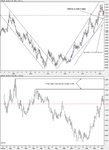Ilia
This from dailyfx may give you some more fundamental clues to possible direction.
"How will the US Presidential Elections Impact the Dollar?
The Presidential Election and the Dollar: The devil you know versus the one you don't
FX market watchers looking for clues from the upcoming US presidential elections between George W. Bush and John Kerry in November may be met with a distinctly one-sided story. While expectations for a Bush win could signal further dollar weakness ahead, a Kerry victory could signal even more.
George W. Bush: The devil you know
Considering solely the economic policy implications of a Bush victory, the market might reasonably expect the dollar to continue its downward trend against its major counterparts.
In response to sizable job losses in several swing states, Bush has sought to make job creation a key domestic priority, evidenced by a $23 billion proposal for job training and employment assistance in fiscal year 2005. Given the stagnant labor market, the Administration would be ill advised to do anything other than maintain its “soft dollar” policy that has been enhancing the competitiveness of American manufacturers and multinationals.
With a steadily weakening dollar, manufacturers enjoy greater pricing advantages over foreign competition while American companies operating overseas translate foreign currency revenues into ever higher dollar profits. To the extent that a weak dollar can help spur payroll growth before November, in the days and months leading up to the election the Bush team can be expected to stay the course on dollar policy in an effort to increase corporate profits and generate jobs in battleground states like Ohio, Pennsylvania and Missouri.
Moreover, the continuation of other Bush fiscal policies aimed at stimulating growth could also be viewed as potential medium-term dollar negatives. Bush's bid to make permanent the tax cuts from his election-year plan threatens to erode confidence in the greenback by creating persistently wider fiscal deficits.
John Kerry: The devil you don't
Expectations for a second Bush term would mark a continuation of the economic status quo, namely a currency policy in tacit support of a weaker dollar. Yet expectations for a Kerry win may lead to uncertainty and speculation that could drive the dollar even lower. The key lies in the market's perception of Kerry's views and intentions on free trade.
Taking a page from his father's 1988 campaign against Michael Dukakis, Bush will likely employ a strategy that paints Kerry as a liberal protectionist aligned firmly with labor union interests and against free trade. On its face, this may seem somewhat difficult given Kerry's moderate voting record in the Senate—on free trade he has been in favor of NAFTA, fast-track presidential trade authority, and permanent normal trade relations with China.
In contrast however, Kerry's recent stance as Democratic presidential nominee takes him much more left of center. While the Bush Administration recently decried “economic isolationism” and recent Congressional action to limit offshore outsourcing, Kerry, in a trade policy pledge, vowed to enact a 120-day review of all existing trade agreements to make sure that they are enforceable and balanced for American workers—hardly a ringing free-trade endorsement. As for offshore outsourcing, Kerry has come out against its use in government contracts and favors a Consumers' “Right to Know” on Call Center Workers policy aimed at stifling the movement of these jobs abroad.
An Expectations Game
The allure of the US economy and its markets stems from their flexibility, adaptability and openness. Protectionism is an antithesis to all of this, and the dollar tends to deteriorate when financial markets sense even a trace of it. All else equal then, the dollar will rally as fears of protectionism fade.
To be sure, Bush is not the staunchest of free trade defenders—witness the Administration's disputes over Chinese textiles and only recently lifted global steel tariffs—yet the Administration has hit the right notes on free trade that the market has so far deemed credible. In political terms, Bush has distanced himself from the protectionist label through repeated statements in favor of free trade and the expansion of NAFTA.
Of Kerry the market seems less sure—as a candidate who has recently railed against offshore outsourcing, Kerry, deservedly or not, is quickly becoming a symbol of free trade barriers and protectionist policies.
Given this uncertainty and expectations of more isolationist policy, all other things unchanged, the effect on the dollar at this point would likely be negative under a Kerry victory scenario—possibly more negative than if Bush were to win.
Fundamentals dictate that the dollar will remain on a downward path regardless of a Bush or a Kerry victory. Expectations—whether they are for the “soft dollar” status quo in the event of a Bush win, or for “protectionist” trade policies in the event of a Kerry win—should contribute to a lower dollar in the run-up to the election. But the issue is one of degree, not direction. Depending on the polls, a market spooked by the harm a President Kerry may cause to US trading relationships could lead to an acceleration of dollar weakness leading into November."


